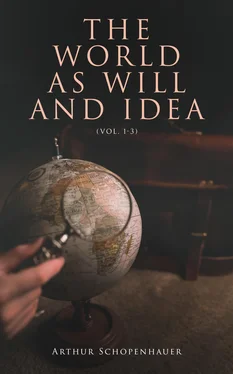It is true that at all times an etiology, unmindful of its real aim, has striven to reduce all organised life to chemism or electricity; all chemism, that is to say quality, again to mechanism (action determined by the shape of the atom), this again sometimes to the object of phoronomy, i.e., the combination of time and space, which makes motion possible, sometimes to the object of mere geometry, i.e., position in space (much in the same way as we rightly deduce the diminution of an effect from the square of the distance, and the theory of the lever in a purely geometrical manner): geometry may finally be reduced to arithmetic, which, on account of its one dimension, is of all the forms of the principle of sufficient reason, the most intelligible, comprehensible, and completely susceptible of investigation. As instances of the method generally indicated here, we may refer to the atoms of Democritus, the vortex of Descartes, the mechanical physics of Lesage, which towards the end of last century tried to explain both chemical affinities and gravitation mechanically by impact and pressure, as may be seen in detail in “Lucrèce Neutonien;” Reil's form and combination as the cause of animal life, also tends in this direction. Finally, the crude materialism which even now in the middle of the nineteenth century has been served up again under the ignorant delusion that it is original, belongs distinctly to this class. It stupidly denies vital force, and first of all tries to explain the phenomena of life from physical and chemical forces, and those again from the mechanical effects of the matter, position, form, and motion of imagined atoms, and thus seeks to reduce all the forces of nature to action and reaction as its thing-in-itself. According to this teaching, light is the mechanical vibration or undulation of an imaginary ether, postulated for this end. This ether, if it reaches the eye, beats rapidly upon the retina, and gives us the knowledge of colour. Thus, for example, four hundred and eighty-three billion beats in a second give red, and seven hundred and twenty-seven billion beats in a second give violet. Upon this theory, persons who are colour-blind must be those who are unable to count the beats, must they not? Such crass, mechanical, clumsy, and certainly knotty theories, which remind one of Democritus, are quite worthy of those who, fifty years after the appearance of Goethe's doctrine of colour, still believe in Newton's homogeneous light, and are not ashamed to say so. They will find that what is overlooked in the child (Democritus) will not be forgiven to the man. They might indeed, some day, come to an ignominious end; but then every one would slink away and pretend that he never had anything to do with them. We shall soon have to speak again of this false reduction of the forces of nature to each other; so much for the present. Supposing this theory were possible, all would certainly be explained and established and finally reduced to an arithmetical problem, which would then be the holiest thing in the temple of wisdom, to which the principle of sufficient reason would at last have happily conducted us. But all content of the phenomenon would have disappeared, and the mere form would remain. The “what appears” would be referred to the “how it appears,” and this “how” would be what is a priori knowable, therefore entirely dependent on the subject, therefore only for the subject, therefore, lastly, mere phantom, idea and form of idea, through and through: no thing-in-itself could be demanded. Supposing, then, that this were possible, the whole world would be derived from the subject, and in fact, that would be accomplished which Fichte wanted to seem to accomplish by his empty bombast. But it is not possible: phantasies, sophisms, castles in the air, have been constructed in this way, but science never. The many and multifarious phenomena in nature have been successfully referred to particular original forces, and as often as this has been done, a real advance has been made. Several forces and qualities, which were at first regarded as different, have been derived from each other, and thus their number has been curtailed. (For example, magnetism from electricity.) Etiology will have reached its goal when it has recognised and exhibited as such all the original forces of nature, and established their mode of operation, i.e., the law according to which, under the guidance of causality, their phenomena appear in time and space, and determine their position with regard to each other. But certain original forces will always remain over; there will always remain as an insoluble residuum a content of phenomena which cannot be referred to their form, and thus cannot be explained from something else in accordance with the principle of sufficient reason. For in everything in nature there is something of which no ground can ever be assigned, of which no explanation is possible, and no ulterior cause is to be sought. This is the specific nature of its action, i.e., the nature of its existence, its being. Of each particular effect of the thing a cause may be certainly indicated, from which it follows that it must act just at this time and in this place; but no cause can ever be found from which it follows that a thing acts in general, and precisely in the way it does. If it has no other qualities, if it is merely a mote in a sunbeam, it yet exhibits this unfathomable something, at least as weight and impenetrability. But this, I say, is to the mote what his will is to a man; and, like the human will, it is, according to its inner nature, not subject to explanation; nay, more—it is in itself identical with this will. It is true that a motive may be given for every manifestation of will, for every act of will at a particular time and in a particular place, upon which it must necessarily follow, under the presupposition of the character of the man. But no reason can ever be given that the man has this character; that he wills at all; that, of several motives, just this one and no other, or indeed that any motive at all, moves his will. That which in the case of man is the unfathomable character which is presupposed in every explanation of his actions from motives is, in the case of every unorganised body, its definitive quality—the mode of its action, the manifestations of which are occasioned by impressions from without, while it itself, on the contrary, is determined by nothing outside itself, and thus is also inexplicable. Its particular manifestations, through which alone it becomes visible, are subordinated to the principle of sufficient reason; it itself is groundless. This was in substance rightly understood by the schoolmen, who called it forma substantialis. (Cf. Suarez, Disput. Metaph., disp. xv. sect. 1.)
It is a greater and a commoner error that the phenomena which we best understand are those which are of most frequent occurrence, and which are most universal and simple; for, on the contrary, these are just the phenomena that we are most accustomed to see about us, and to be ignorant of. It is just as inexplicable to us that a stone should fall to the earth as that an animal should move itself. It has been supposed, as we have remarked above, that, starting from the most universal forces of nature (gravitation, cohesion, impenetrability), it was possible to explain from them the rarer forces, which only operate under a combination of circumstances (for example, chemical quality, electricity, magnetism), and, lastly, from these to understand the organism and the life of animals, and even the nature of human knowing and willing. Men resigned themselves without a word to starting from mere qualitates occultæ, the elucidation of which was entirely given up, for they intended to build upon them, not to investigate them. Such an intention cannot, as we have already said, be carried out. But apart from this, such structures would always stand in the air. What is the use of explanations which ultimately refer us to something which is quite as unknown as the problem with which we started? Do we in the end understand more of the inner nature of these universal natural forces than of the inner nature of an animal? Is not the one as much a sealed book to us as the other? Unfathomable because it is without ground, because it is the content, that which the phenomenon is, and which can never be referred to the form, to the how, to the principle of sufficient reason. But we, who have in view not etiology but philosophy, that is, not relative but unconditioned knowledge of the real nature of the world, take the opposite course, and start from that which is immediately and most completely known to us, and fully and entirely trusted by us—that which lies nearest to us, in order to understand that which is known to us only at a distance, one-sidedly and indirectly. From the most powerful, most significant, and most distinct phenomenon we seek to arrive at an understanding of those that are less complete and weaker. With the exception of my own body, all things are known to me only on one side, that of the idea. Their inner nature remains hidden from me and a profound secret, even if I know all the causes from which their changes follow. Only by comparison with that which goes on in me if my body performs an action when I am influenced by a motive—only by comparison, I say, with what is the inner nature of my own changes determined by external reasons, can I obtain insight into the way in which these lifeless bodies change under the influence of causes, and so understand what is their inner nature. For the knowledge of the causes of the manifestation of this inner nature affords me merely the rule of its appearance in time and space, and nothing more. I can make this comparison because my body is the only object of which I know not merely the one side, that of the idea, but also the other side which is called will. Thus, instead of believing that I would better understand my own organisation, and then my own knowing and willing, and my movements following upon motives, if I could only refer them to movements due to electrical, chemical, and mechanical causes, I must, seeing that I seek philosophy and not etiology, learn to understand from my own movements following upon motives the inner nature of the simplest and commonest movements of an unorganised body which I see following upon causes. I must recognise the inscrutable forces which manifest themselves in all natural bodies as identical in kind with that which in me is the will, and as differing from it only in degree. That is to say, the fourth class of ideas given in the Essay on the Principle of Sufficient Reason must be the key to the knowledge of the inner nature of the first class, and by means of the law of motivation I must come to understand the inner meaning of the law of causation.
Читать дальше












